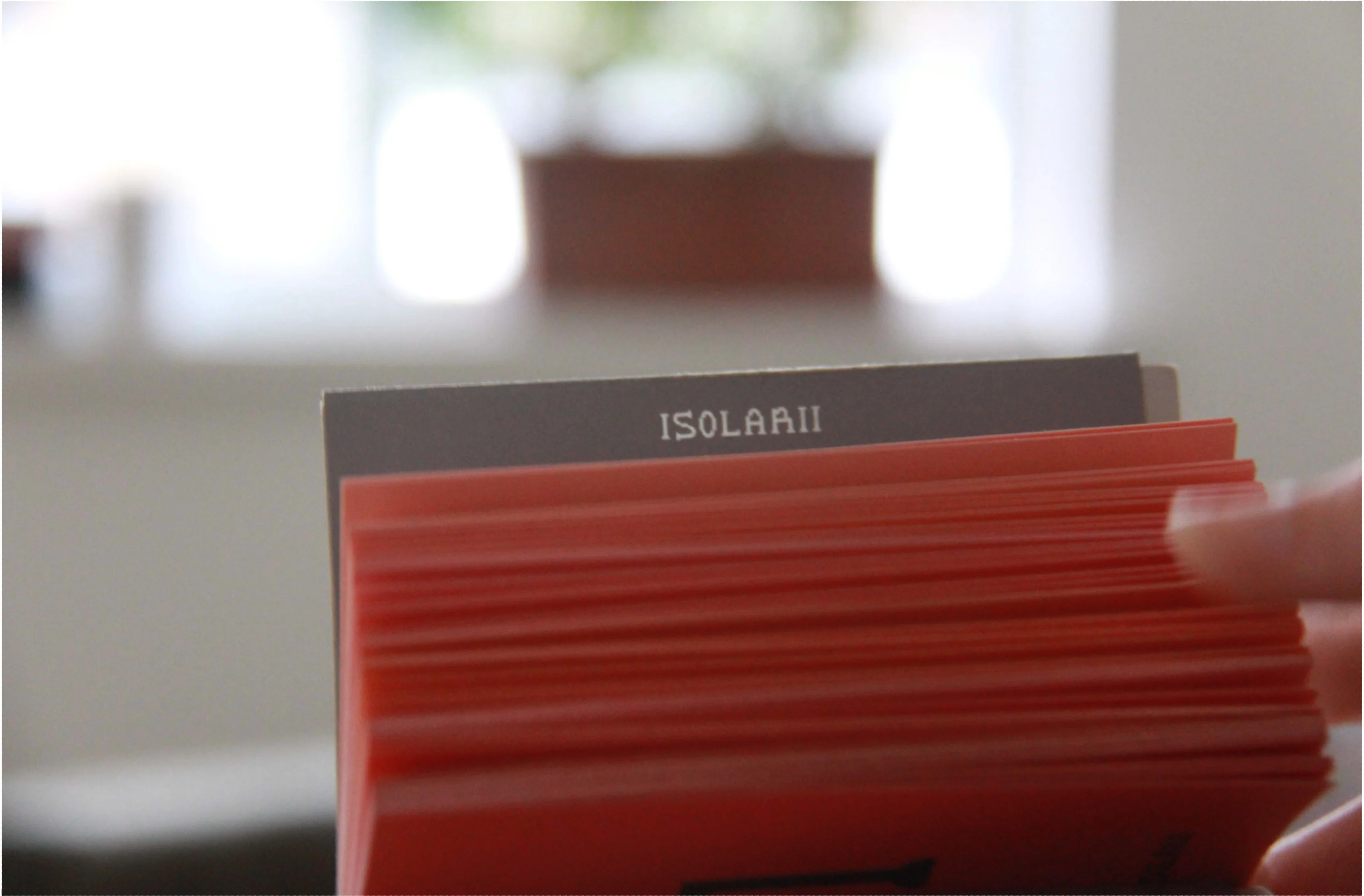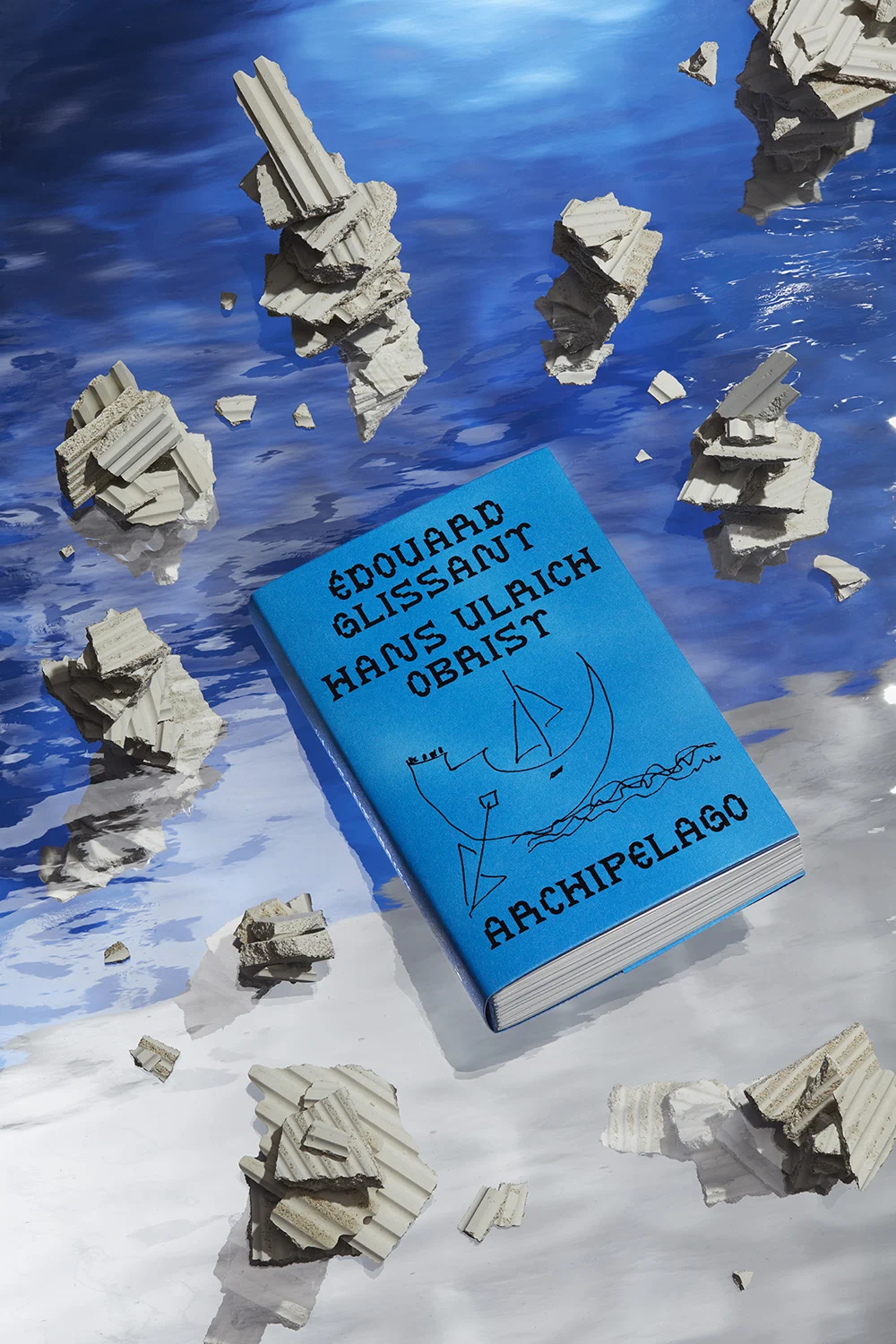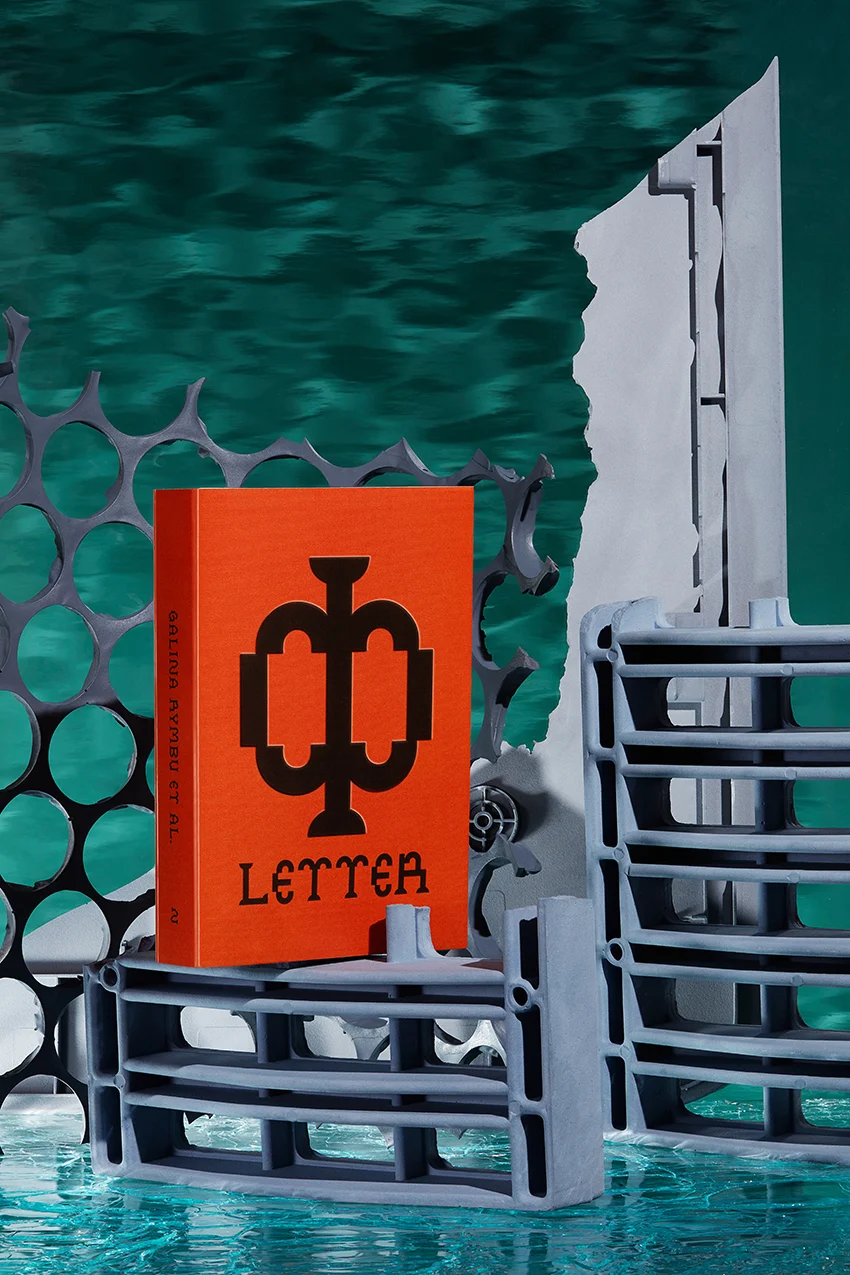

In a world of information overload and instant gratification, publishing imprint ISOLARII are cutting through the noise. With their tiny, iPhone-sized books—whose size enables them to be circulated the world over with ease—they’re looking to spark huge conversations via a web of collaborators from around the globe. Claire Marie Healy spoke to founder Sebastian Clark and a host of contributors to learn more about the “small press that could.”
Photography by Libera Moore.
In publishing, little attention is paid to the very small. Even as lifestyle objects to be photographed straight into phone screens, coffee table books conform to a received idea of the bigger, the better. Meanwhile, small presses offer essential radical perspectives, but paper shortages, shipping restrictions, and rising costs make the matter of getting that work seen by more than a few sets of eyes a seemingly impossible task. As much as we imagine we live in a world of instant access to critical theory, any successful attempt to curate, communicate, and circulate that knowledge in an actually accessible book form has the glow of a miracle.
“We really wanted to screw with scale”, says Sebastian Clark, the co-founder of publishing imprint ISOLARII, which sends out its iPhone-sized books roughly every two months to a global subscriber base. “And to make them as easy to get as possible.” We’re speaking in Clark’s local pub in London, with a rainbow of eight diminutive, though pleasingly thick, titles sticking to the table below us. “We’re committing to an idea that you never know what you're actually going to get,” he continues of ISOLARII’s radical curation of voices. “The reader experiences constant transformation along the way, and commits to receiving new knowledge that you wouldn't get otherwise.”



Founded by Clark—who is now the sole series editor and publisher—and writer and actor India Ennenga in New York in 2020, ISOLARII plays on the assumed parameters of publishing in a way that feels genuinely new, despite drawing its inspiration from obsolescent technologies. Forming “an archipelago of today’s avant-garde movements and figures,” the imprint is a resurrection of the Venetian “island book”: the Renaissance book form which bound together poems, stories, and artworks in books that could act like islands for singular ideas. “How do you take the avant garde and put it into the mainstream?” says Clark of ISOLARII’s goals. “It’s about these little niches and pockets of resistance from around the world. But it's also about trying to get into mass pop culture.”
A few days before we speak, isolarii hosted a London event to celebrate their latest book, “EVER GAIA,” together with its author and ongoing collaborator Hans Ulrich Obrist, and contributor to the book, writer Daisy Hildyard. It seems to have brought home for Clark the popularity of what they’ve put out into the world. “That's what's quite cool about the membership-based aspect, is that people do feel part of this community,” says Clark. It feels like, of all the initiatives to come out of the apocalyptic tenor of our lives since 2020, ISOLARII is one built to last: because it’s about building something within, and for, this particular world. “For us, it came out of a feeling of, the world is fucked. But we're still going to embrace it. And love it for its chaos,” Clark adds.
He—along with collaborators new and old—traced the story of four of ISOLARII’s titles for us: just a handful of islands in a publishing universe that’s only going to get bigger. “The idea is to insert yourself in different parts of the world for brief moments with these projects, and then move on to a different island,” says Clark. “It’s a political project to create a community between these totally fragmented places, and to bring them closer together.”
SALMON: A RED HERRING (2020)

ISOLARII has published eight books to date, with collaborators from across Europe, Asia, the UK, and North America. The books have been inclusive of various genres, from published correspondences to war diaries to poetry, and even a colorful comic strip storybook .
The first artist collaboration to go out to subscribers was “SALMON: A RED HERRING,” a book with Daniel Fernández Pascual and Alon Schwabe of Cooking Sections—the studio whose projects examine how food systems organise the world—and interrogates how they might be reorganized. The book, which exposed the realities of industrial fish farming through a treatise on artificial color, was connected to Cooking Sections’ Tate show of the same name, which eventually led to their nomination for the Turner Prize. “It felt like a nice opportunity, to work with a publisher who was very open to working together and to questioning, in a way, what a book can do,” reflects Schwabe today. The gradation of color of the book’s pages, which directly mirrored the pantone that is used to grade the artificial coloring of salmon for consumers, stated ISOLARII’s intention from the off: to make books in which the design serves as another language for communicating a message.
Clark knew the Cooking Sections team from his time at Goldsmiths' Centre for Research Architecture, and ISOLARII’s early supporter Hans Ulrich Obrist—who at that time was working with Cooking Sections to redevelop the menu of the Serpentine to make it more sustainable—soon became involved in the project. “[Sebastian and India] came to see me quite early in the process when they hadn’t yet published anything,” says Obrist. The curator and writer loved the interdisciplinary nature of ISOLARII from the start; the way it “broke down boundaries through the content, format and also its distribution, helping to get these books into contexts that they may otherwise never reach.” For Schwabe, even with the success of their exhibition, and the real-world activist and community projects it was connected to—removing farmed salmon from Tate restaurants in favor of alternatives that promote regenerative aquacultures, for instance—the book was a key component to that vision. Being purchased and shared long past the exhibition runtime, “Salmon: A Red Herring” offered “another vehicle to communicate and think about the work we do.”
F LETTER (2020)

In many ways, the political scenario of suppression outlined in “F LETTER,” ISOLARII’s book of Russian feminist poetry, anticipated the war in Ukraine a couple of years later, as that book’s co-translator and editor Eugene Ostashevsky can say with hindsight today. “One of the ways in which authoritarianism, of the current variety, publicly tested its waters in Russia was through the passage of anti LGBT laws and different kinds of “traditional values” legislation, including decriminalization of forms of domestic violence,” he says, adding, “this is very important to what's going on now.” Clark originally reached out to Ostashevsky in the Spring of 2019, which is when he pitched to the pair an anthology of young, Russian feminist poets.
One of the fulcrums of the project was the poet Galina Rymbu, who co-edited the eventual book alongside Ostashevsky and translator Ainsley Morse, and whose poetry the ISOLARII team were already aware of. “The widespread feminist protests in Eastern Europe at that time—and Galina as this figurehead of Russian feminism today—really influenced what we did with ‘F Letter,’” recalls Clark. The book, which collated the poetry of many women at the forefront of Russian feminism (Russian-language on the left hand page, their English translation on the right) represented a turning point in terms of what ISOLARII felt their books could—and should—aim to do. “We wanted to fashion an icon for this movement, that could be a symbol for it,” says Clark. “Galina was in ‘TIME’ after this. It really taught us with these books that we’re launching campaigns, more than anything.”
IN THE FACE OF WAR: UKRAINE 2022

Once the war in Ukraine broke out, ISOLARII channeled that theory into action more immediately than printed books allow. Beginning in February 2022, they published the diary of their Kyiv-based writer Yevgenia Belorusets (the author of their “MODERN ANIMAL” in August 2021) as a daily digital newsletter, aiming to communicate the news from a personal vantage point. “It was translated into 13 languages daily, thanks to 13 different translators, and had something like 400,000 readers across those countries. It was an absolutely mind bending, exhausting exercise,” says Clark.
At the 59th International Art Biennale later that year in Venice, ISOLARII published “IN THE FACE OF WAR,” in partnership with the Office of the President of Ukraine. Physically the largest of their titles (in thickness, if not dimensions) it features the diary extracts and work of Belorusets alongside the artists Tetyana Yablonska, Maria Prymachenko, Lesia Khomenko, and Nikita Kadan, and was published while they were all continuing to live and make work in wartime Ukraine (for many, the situation is now different, as the war has escalated). On the occasion of the Biennale pavilion in Venice, ISOLARII also played a key role in another event of note: when Kadan proposed to his girlfriend and fellow artist, AntiGonna, before he had to return to Ukraine, Clark arranged for artist Nan Goldin to step in to perform the marriage ceremony for the pair on a Venetian bridge.
EVER GAIA (2023)
“My work is always about breaching fields and breaking down silos of knowledge,” says Hans Ulrich Obrist of his attraction to the ISOLARII ethos, which has led to his authorship of two books, “The Archipelago Conversations” (2021) and the most recent release, “Ever Gaia”—both of which he sees as part of an eventual trilogy of books covering impactful, though undervalued, cultural theorists. That hot pink and neon-green edition contains writing by Daisy Hildyard (“The Second Body,” “Emergency”), artist Precious Okoyomon, and a central in-conversation between the late scientist James Lovelock and Obrist that took place in September 2015. The texts explore the ramifications of Lovelock’s Gaia theory, which, other than offering us the most enduring theory of how the world’s ecosystem self-regulates—one basis for understanding global warming—also speaks to a non-linear way of seeing that feels important now more than ever, as we strive for a connectivity we’ve alienated ourselves from.
That idea feels, like many of the books, uniquely tied up with what makes ISOLARII tick. “I hope that these books are a toolbox for a lot of people reading it now, in their practice,” says Obrist. “Whether you are a designer, a scientist, a politician, architect, writer, poet, these are very useful as toolboxes. Even if Glissant, or Lovelock, aren’t around anymore, I can work with them every day: and you can work with these concepts in your life, too.” For Clark, the fact that people seem to have really responded to this latest title, as evidenced by the audience at the “Ever Gaia” launch event in London, speaks well to future iterations of ISOLARII that will also aim to foster that real-world presence further. “Eventually, we would like to expand what it means to be a member or subscribe,” he says. “But I only want to do that when it doesn't risk conflicting with this feeling of it being an adventure: between all these kinds of different people, in different places.”

